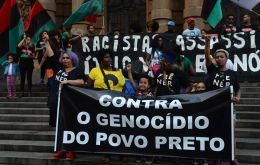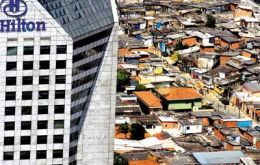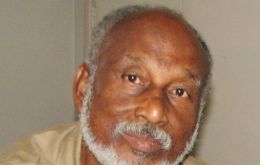MercoPress. South Atlantic News Agency
Tag: black people
-
Saturday, March 29th 2025 - 08:48 UTC
Brazil: Affirmative action reversing white predominance in positions of leadership

Black and indigenous representation in Brazil's Executive branch has risen to 39%, a 17-point increase over 25 years, a study titled ”Black Leadership in the Brazilian State (1995-2024)” (Lideranças Negras no Estado Brasileiro (1995–2024)” released Friday showed.
-
Sunday, December 11th 2022 - 09:22 UTC
Argentina's black players: A WaPo article on race revisited

By Mordechai Taji - A Washington Post article last week resurfaced the issue that Argentina's national football team featured no black players, as opposed to Germany, Spain, France, and other European squads.
-
Monday, September 24th 2018 - 09:17 UTC
Brazil's colored community sponsors Black & Black network to promote its political candidates

In Brazil's general elections approach, a new social network is gaining traction aimed at giving greater visibility to black candidates while highlighting anti-racism initiatives in the country tainted by racial prejudice. Black & Black, which has 100,000 users -- in a population of more than 200 million -- aims to “connect the demands and narratives of the world's black population” and to ensure that “black people get the prominence they deserve.”
-
Thursday, April 19th 2018 - 10:06 UTC
Starbucks “embarrassed” by accusations of racial profiling in US cafes

Starbucks' executive chairman has said he is “embarrassed” by the recent accusations of racial profiling in the company's US cafes. Howard Schultz's comments came after Starbucks announced it will close US stores on 29 May for company-wide “racial bias training”.
-
Tuesday, October 16th 2012 - 07:37 UTC
Brazil implements racial and income affirmative action at federal universities

The law which forces Brazilian federal universities to leave 50% of higher education seats to students from government schools and minorities such as blacks and indigenous became effective on Monday.
-
Friday, August 10th 2012 - 07:57 UTC
Brazil votes affirmative action for blacks and minorities in federal universities

The Brazilian Senate has approved an affirmative action bill that reserves half the spots in federal universities for high school graduates of public schools, and distributes them according to the racial makeup of each state.
-
Thursday, November 17th 2011 - 19:07 UTC
Non-white, the majority population in the ‘racial democracy’ of Brazil

For the first time, non-white people make up the majority of Brazil's population, according to preliminary results of the 2010 census. Out of around 191m Brazilians, 91 million identified themselves as white, 82m as mixed race and 15m as black.
-
Friday, September 16th 2011 - 16:04 UTC
Dramatic increase of intermarriage between whites and blacks, shows US census

Marriages between whites and blacks in the United States have become less infrequent, going from being relatively rare 30 years ago to comprising a notable percentage of such unions, a study published Thursday found.
-
Tuesday, July 26th 2011 - 21:09 UTC
US wealth gap between whites and minorities is the highest in 25 years says Pew

Wealth disparities in the United States between white households and black and Hispanic households are greater than they’ve been in the past 25 years, a new study from the Pew Research Centre reveals.
-
Thursday, May 12th 2011 - 06:28 UTC
Cuban blacks and mulattos the main victims of Raul Castro’s reforms

Cuban blacks and mulattos will suffer the most with the elimination of a million government jobs, which could easily become a racial problem, consequence of the radical reforms imposed, and ‘must be addressed as a priority’, points out a report from Cuban academic Esteban Morales.
